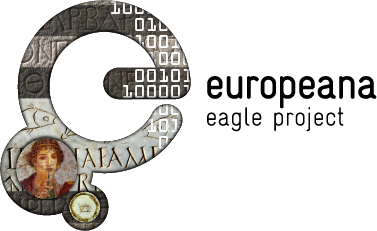EAGLE2014 Sessions
On this page you will find a detailed breakdown of the Call for Participation, with sessions divided by topic.
Session 1 –Harmonization of Content and Geographical information
Organisers: Silvia Evangelisti, Francesco Mambrini
The harmonization of heterogeneous data is an undertaking which new technologies have highly simplified and in some cases made possible for the first time. Gazetteers and vocabularies have the potential to meaningfully connect sets of data so that explicit but sometimes unforeseen connections become available and provide new paths for research. An almost costless effort bringing differences together for further richness of information out of complexity and without standardization. Due to the recent developments and projects in this field, we would like to invite papers on two separate themes including topics listed below each.
GIS and places networking
- Linking ancient data about places
- Wikidata as the gazetteer of gazetteers
- Bringing geographical information to the public
- gathering and exploiting geographical data
- maps and epigraphy
- merging data and dealing with complex layered situation
- fine grained GIS: case studies
- GIS and 3D
Vocabularies and terminologies
- definitions of vocabularies,
- dealing with peculiarities, recording multiple languages,
- alignment and harmonization
- possibilities of exploitation of vocabularies
- dating criteria for epigraphic material: possible approaches
- matching museums, archeology and epigraphy: paths ahead towards further ways to build networks of data.
We would welcome for this panel both full and short papers, demo and posters according to the general guidelines of the call for papers.
Session 2 – Translations and Linked Open Data
Organisers: Ulrich Gehn, Francesco Mambrini, Andrea Zanni
The need for translations of epigraphic documents both for didactic and research purposes as well as for user engagement has become patent in the latest years. A series of extremely interesting projects has taken steps towards this aim and many questions and answers have been raised and proposed. We would like in this panel to invite speakers to reflect on these issues and projects. Presentations can address (but are not limited to) the following topics:
- existing projects on translations of inscriptions or including translations of inscriptions
- methods and aims of translations of inscriptions
- possibilities of enlargement of scope for translated materials
- museums and translations of epigraphic documents
- best practices for content enrichment by professionals and amateurs.
- the curation of content and the capacity of supporting its preservation
We would welcome for this panel both full and short papers, demo and posters according to the general guidelines of the call for papers.
Session Three – Intellectual Property Rights
Organiser: Organiser: Christian Uhlir, Alessandra Giovenco
Intellectual Property Rights (IPR) legislations are different in each European country. One of the major challenges for the online publication of digital content is to make sure that it complies with all of these different regulations. A lot of work has already been done in this field but there is still a need for more elaboration. This session aims to discuss European and National Intellectual Property Rights legislation, and Europeana’s approach to those legislative issues in the way of projects, experiences and strategies for open access to Cultural Heritage digital content.
The following topics should be addressed together with best practice presentation:
- European and national regulation about IPR
- Intellectual Property Rights on digital content for Europeana
- Rights management issues such as OTRS (Open Ticket Request Systems)
- Copyright labeling and reuse of material (Methods and Software)
- Copyright agreements – Cultural Heritage and the Internet
- Wikimedia Commons and IPR
- Future challenges to accessing digital Cultural Heritage resources
We would welcome both full and lecture-summarizing short papers as well as posters according to the general guidelines of the call for papers.
For the sharing of methods, standards and practices, and institutional rights for the management and dissemination of project results, the following audience is targeted:
- Representatives of Europeana and European Institutions
- National Wikimedia organisations
- Specialists involved in Europeana Projects and comparable
Session Four – User Engagement
Organiser: Christian Uhlir, Francesco Mambrini, Raffaella Santucci
User engagement (online and real world) plays a central role in the success of many initiatives and projects in cultural heritage that disseminate project results to the general public. Various physical and digital media formats are used to employ (often individually developed) didactic concepts.
Knowledge transfer methods as used in museum exhibitions, guided tours and educational projects are critical to the success of user engagement measures.
Besides face to face interaction in lectures, workshops, training, etc., various online tools are used, including cultural heritage Web sites/portals and related apps. Social networking systems are integrated throughout.
The success of face to face interactions strongly depends on the didactic concepts used and the personal traits and dedication of teachers, guides and museum education officers.
The success of online user engagement, and more significantly its prediction is somewhat of a black box. A large community is involved in online user engagement research to discover and leverage data about users’ behavioral patterns. They try to provide features, functionalities and ‘experiences’ accordingly to attract users’ involvement, facilitate their interaction and enhance the long-term satisfaction. The main problem with this approach is the lack of significant data; sites like Facebook or Google do not release their user data, so roundabout ways of assessing data are used, none of which are reliable. Furthermore, the reports done by companies in this field are mostly done on a commercial basis and not accessible to the academic field.
The following topics should be addressed along with best practice presentations:
- Services for specific user groups (e.g. educational projects)
- Studies of user behavior and identification of user groups
- Concepts to achieve the active participation of user groups
- Best practices in data visualization and interpretation
- Mining and interpretation of user engagement data
- Guidelines for user engagement design
- Presentations of successful applications
We would welcome both full and short papers on lectures as well as posters according to the general guidelines of the call for papers.
For the sharing of methods, standards and practices and successful dissemination of project results the following audience is targeted:
- Museum specialists in classics
- IT specialists for online user engagement
- IT specialists for validation methods
- Classics (Epigraphic) community involved in educational projects
- Specialists in didactics of European Projects and comparable
Session Five: Cultural Heritage and the Social Web
Organisers: Marco Rendina, Raffaella Santucci, Valentina Vassallo
Social networks are increasingly dominant in our daily experiences of the internet.
The extent to which these powerful networks can be utilized to the benefit of cultural heritage (and particularly ancient cultural heritage), is yet to be fully understood. To achieve a clearer sense of how the immense power of social networking can be harnessed to these scholarly ends, an investigation is in order.
This session aims to articulate and summarize the various means by which academic institutions and researchers have been taking advantage of social networking opportunities to facilitate various aspects of their scholarship.
We invite presentations regarding the utilisation of social media for museum public outreach, the application of social web to the creation user generated content for Cultural Heritage, and the establishment of profile pages for cultural heritage projects on popular social networking sites. Organisations both commercial and academic are welcome.
We also encourage the submission of papers addressing theoretical approaches to the analysis of the Web’s general impact on the creation and diffusion of cultural heritage projects.
Session six: Digital approaches to cross-disciplinary studies of inscriptions
Organisers: Sorin Hermon, Franco Niccolucci, Raffaella Santucci
This session aims at gathering papers and creating a constructive discussion regarding digital approaches to the cross-disciplinary study of inscriptions.
The papers we are looking for addressing topics such as (but not limited to):
- 3D digitization of inscriptions
- digital analyses of inscriptions,
- virtual re-contextualization of inscriptions
- integration of epigraphy in wider contexts of digital infrastructures

